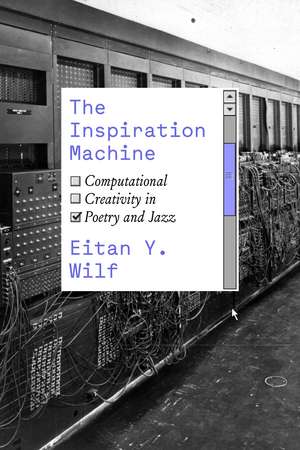The Inspiration Machine: Computational Creativity in Poetry and Jazz
Autor Eitan Y. Wilfen Limba Engleză Paperback – 27 noi 2023
In The Inspiration Machine, Eitan Y. Wilf explores the transformative potentials that digital technology opens up for creative practice through three ethnographic cases, two with jazz musicians and one with a group of poets. At times dissatisfied with the limitations of human creativity, these artists do not turn to computerized algorithms merely to execute their preconceived ideas. Rather, they approach them as creative partners, delegating to them different degrees of agentive control and artistic decision-making in the hopes of finding inspiration in their output and thereby expanding their own creative horizons.
The algorithms these artists develop and use, however, remain rooted in and haunted by the specific social predicaments and human shortfalls that they were intended to overcome. Experiments in the digital thus hold an important lesson: although Wilf’s interlocutors returned from their adventures with computational creativity with modified, novel, and enriched capacities and predilections, they also gained a renewed appreciation for, and at times a desire to re-inhabit, non-digital creativity. In examining the potentials and pitfalls of seemingly autonomous digital technologies in the realm of art, Wilf shows that computational solutions to the real or imagined insufficiencies of human practice are best developed in relation to, rather than away from, the social and cultural contexts that gave rise to those insufficiencies, in the first place.
| Toate formatele și edițiile | Preț | Express |
|---|---|---|
| Paperback (1) | 214.61 lei 3-5 săpt. | +13.06 lei 7-13 zile |
| University of Chicago Press – 27 noi 2023 | 214.61 lei 3-5 săpt. | +13.06 lei 7-13 zile |
| Hardback (1) | 616.34 lei 6-8 săpt. | |
| University of Chicago Press – 27 noi 2023 | 616.34 lei 6-8 săpt. |
Preț: 214.61 lei
Nou
Puncte Express: 322
Preț estimativ în valută:
41.07€ • 44.79$ • 34.63£
41.07€ • 44.79$ • 34.63£
Carte disponibilă
Livrare economică 03-17 aprilie
Livrare express 20-26 martie pentru 23.05 lei
Preluare comenzi: 021 569.72.76
Specificații
ISBN-13: 9780226828336
ISBN-10: 0226828336
Pagini: 288
Ilustrații: 10 halftones
Dimensiuni: 152 x 229 x 20 mm
Greutate: 0.34 kg
Ediția:First Edition
Editura: University of Chicago Press
Colecția University of Chicago Press
ISBN-10: 0226828336
Pagini: 288
Ilustrații: 10 halftones
Dimensiuni: 152 x 229 x 20 mm
Greutate: 0.34 kg
Ediția:First Edition
Editura: University of Chicago Press
Colecția University of Chicago Press
Notă biografică
Eitan Y. Wilf is associate professor of anthropology at the Hebrew University of Jerusalem. He is the author of School for Cool and Creativity on Demand, both published by the University of Chicago Press.
Cuprins
Acknowledgments
Introduction: Toward an Anthropology of Computational Creativity
PART I Jazz: Mimicry, Originality, Sociality
1 “I Prefer Playing with It to Playing with Most People”: The Computer as a Musical Conversation Partner
2 An Island of Interactivity in an Ocean of Nonreactivity: The Trade-Offs of a Made-to-Order Artificial Musical World
3 “A Device That Would Generate New Musical Ideas”: The Computer as a Source of Musical Inspiration
4 Separating Noise from Signal: The Ethnomethodological Uncanny as Aesthetic Pleasure in Human-Machine Interaction
PART II Poetry: Indeterminacy, Potentiality, Intentionality
5 Computer-Generated Poetry and Some of Its Aesthetic and Technical Dimensions
6 “I Randomize, Therefore I Think”: Computational Indeterminacy and the Tensions of American Liberal Subjectivity
7 Analog Precursors and Their Digital Logical End: The Oulipo
8 Crosscurrents and Opposing Perspectives
Conclusion: Neither Our Doom nor Our Salvation: Open-Ended Digital Systems and Cultural Critique
Notes
References
Index
Introduction: Toward an Anthropology of Computational Creativity
PART I Jazz: Mimicry, Originality, Sociality
1 “I Prefer Playing with It to Playing with Most People”: The Computer as a Musical Conversation Partner
2 An Island of Interactivity in an Ocean of Nonreactivity: The Trade-Offs of a Made-to-Order Artificial Musical World
3 “A Device That Would Generate New Musical Ideas”: The Computer as a Source of Musical Inspiration
4 Separating Noise from Signal: The Ethnomethodological Uncanny as Aesthetic Pleasure in Human-Machine Interaction
PART II Poetry: Indeterminacy, Potentiality, Intentionality
5 Computer-Generated Poetry and Some of Its Aesthetic and Technical Dimensions
6 “I Randomize, Therefore I Think”: Computational Indeterminacy and the Tensions of American Liberal Subjectivity
7 Analog Precursors and Their Digital Logical End: The Oulipo
8 Crosscurrents and Opposing Perspectives
Conclusion: Neither Our Doom nor Our Salvation: Open-Ended Digital Systems and Cultural Critique
Notes
References
Index
Recenzii
“In this moment when generative AI is being declared the successor to human creativity, Wilf offers us a vital counternarrative. His nuanced ethnographic investigations challenge myths of autonomy in either creative practitioners or computational machines while insisting on the cultural/historical embeddedness and situated practices of meaning-making. This book should become an obligatory reference for anyone speaking about computational creativity.”
“The Inspiration Machine powerfully unsettles both commonplace imaginaries and banal critiques of how digital technology shapes and reshapes contemporary art-making. Along the way it clearly establishes Wilf as anthropology’s leading theorist of modernity’s vexed relationship to creative practice.”
“The Inspiration Machine is itself a model and an inspiration, a highly original and ethnographically rich exploration of digital art-making. Drawing upon three revelatory case studies—and on a broad and subtle engagement with contemporary theory—Wilf illuminates the complex mutual entanglement of machinic creativity with human practices, aesthetics, and sociality. This is a singular study of emergent relationalities in unexpected places and practices and wonderful to think with.”
